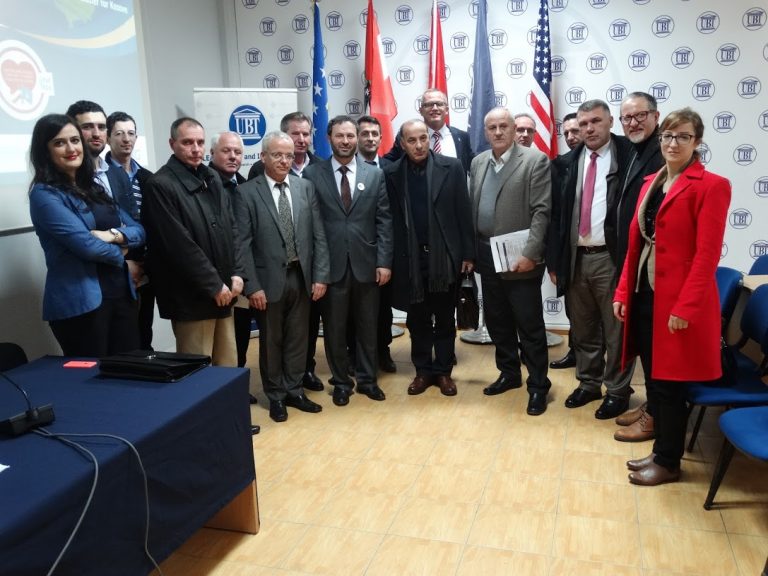
Kosovo Faces Serious Housing Problems
10/02/2016Organized by the UBT, the Austrian-Kosovo Society, and NGOs dealing with social housing and property rights in Kosovo, a conference “Austrian-Kosovar Social Shelter Day” was held on Wednesday 10 February. Same as in the case with similar events, panelists from Kosovo and Austria made valuable presentations on the topic.
Opening the conference, UBT Rector, Prof. Dr. Edmond Hajrizi, spoke about the importance of this project for the population, especially those in the need of housing. Among others, he spoke commented on the cooperation between the UBT and organizations from Austria and Kosovo.
“The good side of this story is that we have seen extensive construction activities in Kosovo. The UBT has a license to certify administrators of the public collective residences,” Hajrizi said.
Merita Dalipi, a representative of the Ministry of Spatial Planning, focused on the importance of the social housing projects. According to her, Kosovo has already passed the integration process. “Kosovo has passed a process of integration but the situation with regard to the social housing remains difficult, even though a lot of work has been done in the case of the legislation,” Dalipi said.
Murat Hoxha, a representative of the Kosovo geodesist, focused on the property issue, as one of the important aspects of economic development of Kosovo.
Wolfgang Amann, an associate professor from Austria, spoke about Austria’s experiences in the social housing. He presented tables and detailed representative of engagement of other European countries in this respect. He recommended the Kosovars to develop this aspect by focusing on the families in need. “Austria had a project which lasted for 20 years and it invested in 12 countries,” he said.
Professor Amann also offered his recommendations on how the project should develop in Kosovo. “In order to have successes, one needs to focus on the quantity, provision, and quality of residential areas, urban development, social integration and so on,” Mr. Amann said.
Mentor Hoxha, member of the System of Cadastral Property in Kosovo, focused on the private property problems that Kosovo as a new country has been facing in the aspect of cadastral property and violation of Kosovo citizen’s privacy. Another problem, according to him, is related to the selling of the properties more than once, as a result of the problems with property rights. However, he said, he was optimistic that the situation in Kosovo would change soon because the technology development plays a role in this.
“We are living in some sort of a ‘big brother’ system, with satellites watching us during the whole time and there also the Google Map which can tell us exactly where we are and what we possess,” Mr. Hoxha said. According to him, another challenge for the new state of Kosovo is linked to the freedom of information, which will persist until a legal framework has been adopted since there has not been effective supervision on the measures in the cases when privacy of citizens has been violated. He said he was in favor of transparency of cadastral data and he supported the Austrian model.
Agron Beka, a representative of the NGOs, spoke about the model of social housing in Britain, which, ha advised, could also be applied in our country. According to him, a problem with our leadership is that they do not understand clearly the role of social housing, that is, they are not aware of such a service which is given to the citizens and is a legal obligation. “Social housing is regulated by laws and as such it is a legal obligation,” Beka said.
Further he explained that the government and different NGOs had built between 2005 and 2015 around 146 houses for this purpose, most of them for the Serb community, which continue to remain vacant because they decided to return to Serbia or other places. He also mentioned another very important project, “You Too Can Offer Shelter,” whose goal was provision of shelter to over 1000 families during the winter months. That project was made possible by his NGO in cooperation with the UBT College, the diaspora, as well as the private businesses, with UBT Rector Edmond Hajrizi being its board director.
Zana Tabaku, an expert on administration of social housing, also contributed to the conference. She advised that last year a system of registration of persons who needed shelter had been launched, which included also data on their housing in shelters. The system included the ways paying of the rents as well as the maps where those shelters are located. She expressed willingness to explain the way the system functioned to all those interested.
Shkumbin Asllani, noted that the UBT had established a Study Center as part of the Law Faculty. He detailed the way the legal analysis was made aimed at finding the shortcomings. He also urged the Ministry of Labor and Social Wellbeing to review the laws with regard to the social housing.
Asllani noted that as part of the analysis, the issues related to social housing would also be addressed and recommendations would be given to the government for solving the problem. “Legal analysis and property legislation are very important because since the end of the war we have not seen such studies and recommendations,” he said.
Rame Hamza from the Ministry of Labor and Social Wellbeing made the closing remarks of the conference. He said the ministry’s beneficiaries were among the biggest spenders of the Kosovo budget with around 80% of it. He explained that the ministry had built a number of social housing facilities in different municipalities and towns. “The Ministry of Labor and Social Wellbeing is somewhat sacred because it has taken up a sacred mission,” he said.
He said they were responsible for providing the food for the families in need but not for their housing because this has now become part of the responsibility of the local governments. However, despite this, he said, the ministry would continue to help and make its contribution in coping with this problem.